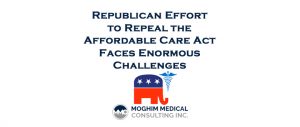 For years, the Republican party has promised to abolish the Affordable Care Act, and with the election of Donald Trump to the Presidency, the moment appeared to have arrived. However, the GOP—which now controls the executive branch as well as both legislative houses—is having difficulty creating a legislative package that appeals to the entire party. The first GOP bill, the American Health Care Act, was authored by House Speaker Paul Ryan and appears to be a divisive proposal that many conservatives are unwilling to support.
For years, the Republican party has promised to abolish the Affordable Care Act, and with the election of Donald Trump to the Presidency, the moment appeared to have arrived. However, the GOP—which now controls the executive branch as well as both legislative houses—is having difficulty creating a legislative package that appeals to the entire party. The first GOP bill, the American Health Care Act, was authored by House Speaker Paul Ryan and appears to be a divisive proposal that many conservatives are unwilling to support.
The American Health Care Act was introduced on March 6, 2017 and replaces government subsidies under ACA with tax credits. It would retain the health insurance marketplaces and allow children to remain on their parents’ plans until age 26. While it would also bar insurers from denying people with prior health conditions, the new bill would allow states to innovate strategies to help high risk individuals through $100 billion in grants over nine years. The American Health Care Act would also enact a 2020 deadline on funding new Medicaid enrollees.
Shortly after introduction of the American Health Care Act, the nonpartisan Congressional Budget Office released their analysis. The CBO estimated that if the new bill was enacted, almost 24 million Americans would lose their health coverage over the next ten years. As a result, 14 million people will lose coverage in just the first year. The positive news, however, is that it would cut the federal deficit by $337 billion over a ten year period.
The bill and the CBO’s report have made the American Health Care Act a virtual non-starter for the House leadership, as well as a rallying cry for key U.S. constituencies. Already major groups like the American Medical Association, American Hospital Association, and American Association of Retired Persons have voiced their opposition to the bill. Most of the criticism centers on denying health care access to so many Americans, especially the most needy—the poor and elderly.
The bill has already hurdled one obstacle by advancing through the House Budget Committee by a vote of 19 to 17. A number of GOP members—members of the far right House Freedom Caucus—on the committee joined the 14 Democrats to vote against the bill. This may be a meaningless victory in the long run, because key Republican Senators have publicly said that the AHCA in its current form could not pass in the Senate which has a 52-48 GOP majority.
President Donald Trump has yet to publicly embrace the AHCA despite his administration’s considerable input in drafting the bill. His new Health and Human Services Secretary Tom Price has, however, supported the bill and argued that the CBO’s report is inaccurate. With almost 40 percent of the nation strongly opposed to the new bill, it seems unlikely that the Trump administration will remain attached to this particular proposal. This initial legislative failure should spur the administration and Congress to consult more closely before releasing a follow up proposal.
Article written by: Robert Moghim, M.D. – CEO, Moghim Medical Consulting
